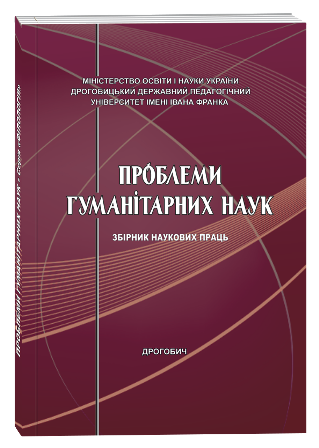ACCUSATIVE AND CREATIVE CASES OF THE SEMANTIC SUBJECT IN ONE-PART SENTENCES OF POETIC TEXTS
DOI:
https://doi.org/10.24919/2522-4557.2019.44.191906Keywords:
accusative case of the subject; the creative case of the subject; intention; partitiveness; perfective meaning; predicative meaning; semantic subjectAbstract
The purpose of the article is to research the types of semantic subject models in poetic texts attested by the forms of accusative and creative cases, the presence of which can be observed mainly in one-part sentences. The topicality of the article is revealed in the fact that it is mononuclear sentences predominant in poetic texts which supply interesting and presently neglected material. Such material offers a wide research field in studying the types of different models of semantic subject, exactly in our case – the subject suggested by the author of poetic work. The task of the article is to analyze the semantic syntactic character of the specified models of semantic subject based on the structure of mononuclear sentences. The given research finally enables to consider the semantics of mononuclear sentences in poetic texts the priority model of which is the accusative case of the semantic subject. As a result, this study makes it possible to consider the semantics of one-part sentences, texts of poetic works, the priority model of which is the accusative and creative cases of the semantic subject. These studies give reason to claim that the genitive case in negative constructions completely loses ground to the accusative case. The research presented concludes that in definite groups of mononuclear sentences in poetic texts the accusative case of semantic subject combines the subject of speech and the subject of state, thus performing its subordinate individual semantic syntactic function. It makes literary texts more informative and semantically rich.
References
Арутюнова, Н.Д. (1988). Типы языковых значений: Оценка. Событие. Факт. Москва: Наука.
Буслаев, Ф.И. (2016). Историческая граматика русского языка. Москва: Либроком.
Вечорек, Д. (1982). Несогласованные асимметричные русские предложения в сопос-тавлении с польським. Wrocław.
Вихованець, І.Д. (1971). Синтаксис знахідного відмінка в сучасній українській мові. Київ: Наукова думка.
Вихованець, І.Д. (1987). Система відмінків української мови. Київ: Наукова думка.
Галкина-Федорук, Е.М. (1948). Безличные инфинитивные предложения. Москва: МГУ.
Золотова, Г.А. (1982). Коммуникативные аспекты русского синтаксиса. Москва: Наука.
Костенко, Л. (1961). Вітрила. Лірика. Київ: Радянський письменник.
Костенко, Л. (1989). Вибране. Київ: Дніпро.
Крымский, А. (1907). Украинская грамматика. Москва: Типография Вяч. Ал. Гатцук.
Олійник, Б. (1985). Вибрані твори. Т. 1: Лірика. Київ: Дніпро.
Павличко, Д. (1964). Пелюстки і леза. Київ: Дніпро.
Симоненко, В. (1984). Поезії. Київ: Радянський письменник.
Симоненко, В. (2001a). Берег чекань. Київ: Наукова думка.
Симоненко, В. (2001b). Ти знаєш, що ти – людина. Київ: Наукова думка.



